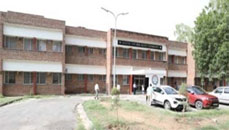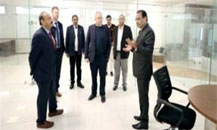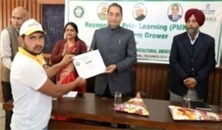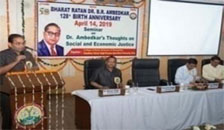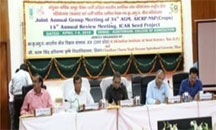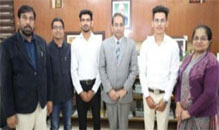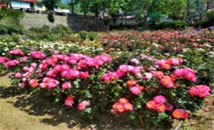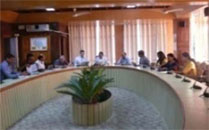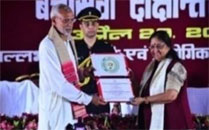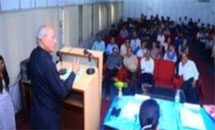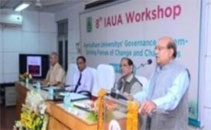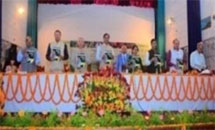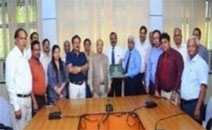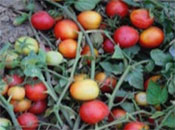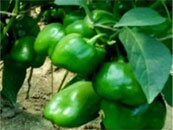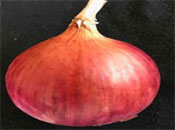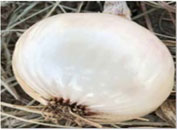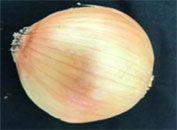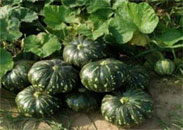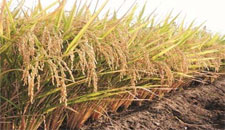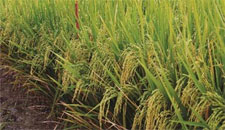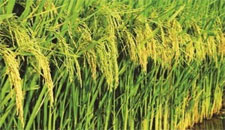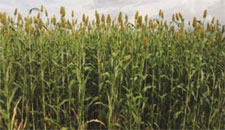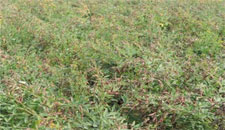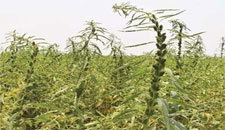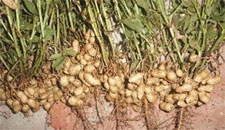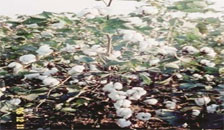
Organic Incense Sticks from Flowers Offerings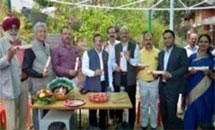 Dr H.C. Sharma, VC , launching
organic incense sticks Pure organic incense sticks prepared from flowers, offered by devotees at religious places, were launched at the Rose Festival of the Dr Y.S. Parmar University of Horticulture and Forestry, Nauni. The incense was prepared by Una-based entrepreneur Shri Ravinder Prashar, with the technical guidance from the scientists of the university. The idea, supported under the Chief Minister’s Start-up scheme, aims to provide a novel solution to the problem of disposal of flowers offered by the devotees at places of worship. Moreover, these flowers used in religious places and functions also get a new life in the form of incense sticks.
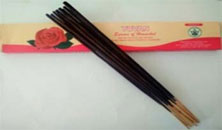 Organic incense sticks
The start-up scheme of Himachal Pradesh envisages practical exposure, orientation training, entrepreneurial guidance and hand-holding to potential entrepreneurs whose projects are approved. Once a project is recommended by the host institution and approved by the empowered committee, monthly support is provided as sustenance allowance for 1 year. One such incubation centre was established at UHF in 2017. The centres support the start-ups and innovation by providing mentoring services, access to their labs and facilities on a free-of-cost basis.
Inter College Sports and Youth Festival concludes at UHF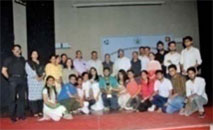 Team of College of Horticulture,
receiving Trophy |
NICRA award to K.V.K., Chamba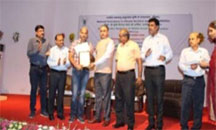 Scientists receiving best NICRA award
Under the project, KVK, Chamba carried out interventions at village Lagga, which falls under Mehla block of district Chamba. It comprises 7 small villages, viz. Lagga, Pudhruin, Ghati, Osal, Hathla, Shakla and Prechha. In the first phase (2011-2016), 102 families were selected covering an area of 89 ha, under different interventions. Four modules, viz. Natural Resource Management, Crop Production, Livestock and Fisheries, and Capacity Building were covered. Different interventions/ demonstrations were also carried out in these selected villages. In 2018, 5 more villages were adopted to upscale the proven technology of existing villages. Successful interventions include the introduction of spur-type apple plantations in 24.9 ha area, 64 polyhouses, crop diversification with cabbage (46.0 ha), crop diversification with cauliflower (59.5 ha) and protected cultivation in 0.80 ha area (Capsicum, cucumber and tomato are grown under protected cultivation).
Development of Eco-friendly Technologies and Improved Cultivars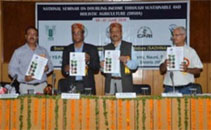 Dr A.K. Chakrabarti, and university
officials releasing souvenir |
|
The SPARC programme of the Government of India facilitates completely-funded international research collaborations of Indian universities (top 100 National Institute Ranking Framework ranked) with the best institutions (top 500 ranked) in the world.
Release of Cowpea VarietiesOne improved breeding line, ‘PGCP-24’ (Pant Lobia-7) of Pantvarsity was identified for release by Variety Identification Committee during the Annual Group Meet on kharif pulses of All India Co-ordinated Research Project on Mung-bean, urdbean, lentil, lathyrus, rajmash and field pea and All-India Network Project on Arid Legumes, held at Acharya N.G. Ranga Agricultural University, Lam, dist. (Guntur) during 19-21 May 2019.
Release of Cowpea Variety for Cultivation in KeralaPantnagar university’s another cowpea breeding line ‘PGCP-23’ (Pant Lobia-6) has shown consistently superior performance in Kerala, and it has been identified to be released for cultivation in 2019 in that state.
Prospective Technologies Recently Given to FarmersAwareness prog-ramme on honey-bee protection organized by Department of Entomology of the university, took out an awareness rally on World Honey-bee Day passing through different parts of the campus, to create awareness about the importance of honey-bees for human-beings and the measures to be taken to protect honey-bees, including avoiding the use of insecticides during flowering’ of various crops.
The Honey-bee Research and Training Centre of the university also organized an awareness programme on honey-bee protection on this occasion at Campus School of the university. The students were told about the importance of this special creature, i.e., honey-bee, in pollination in different crops, leading to increase in quality and production besides the various ways to protect honey-bee, to save the humanity. Students also pledged to protect honey-bees.
PUNJAB AGRICULTURAL UNIVERSITY, LUDHIANAWorld Health DayDepartment of Food & Nutrition, College of Community Science, PAU, Ludhiana, along with members of Indian Dietetics Association, Punjab chapter celebrated the World Health Day on 9 Apr, 2019 with the theme ‘Universal Health Coverage: Everyone, Everywhere’. Walkathon was organized at PAU, Ludhiana in the morning by the students and faculty members of PAU, Indian Dietetics Association,
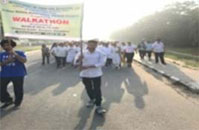 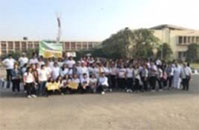
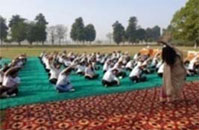 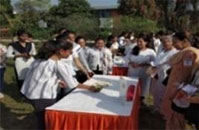
Celebrate World Health Day
World Environment DayThe Departments of Soil Science, Forestry and Natural Resources, PAU, Ludhiana in association with the ICAR National Agricultural Higher Education Project -Centre of Advanced
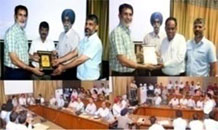 World Environment Day Celebration
|
Dr J.S. Mahal, Director of Extension, gave a call for genuine sensitization towards need to preserve bio-diversity. Dr S.S. Kukal, Dean, College of Agriculture, dwelt on small self-checks at personal level, like mindful use of water, growing fruit trees and minimizing ward-robe size as effective ways towards environment conservation. Shri Rohit Mehra, (IRS), Additional Income Tax Commissioner spoke on the need for returning back to our roots and growing important trees like Neem, Peepal and Moringa with double benefit of health promotion and environment conservation.
Hands-on Training on Statistical Tools and Database ManagementA Hands-on training on Statistical Tools and Database Management was organized by Department of Soil Science, (PAU, Ludhiana) during 10-15 June, 2019, under the ICAR NAHEP-CAAST project,
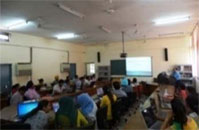 Hands-on training on Statistical
Tools and Database Management organized by the Department of Soil Science Varieties/Hybrids developed: The following varieites or hybrids were developed by the univeristy
|
Seed Mela - 2019The Seed Mela-2019, organized on 24 May 2019 at university auditorium premises, Rajendranagar, and simultaneously at RARS, Jagtial, Warangal and Palemto provides a common platform to farmers of Telangana for purchase of quality seed of various crops.
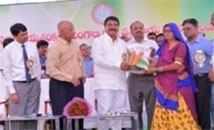 Participants at Seed Mela 2019
Shri Singireddy Niranjan Reddy Minister released six DVDs developed by Electronic Wing of the university in vernacular language on Integrated pest management of fall army worm in maize, Safe use of pesticides, Mat nursery for mechanized transplanting in rice, Seed treatment, Mechanized planting in ID crops, and Alternate wetting and drying method of rice cultivation. Dr V. Praveen Rao, VC, in his address elaborated on the efforts put forth to supply quality seed to the farmers, while announcing the release of eight new varieties soon. He registered his gratitude to the farmers who were continuously encouraging the university scientists by adopting the new technologies and varieties developed at the PJTSAU. Twenty four crop varieties were arranged for sale, including fine-grain (RNR 15048, WGL 44, Krishna, BPT 5204) and coarse-grain varieties (JGL 18047, KNM 118, MTU 1010) of rice, maize (DHM 117), sorghum (CSV 31), redgram (WRG 65, PRG 176, TDRG 4, Asha ), greengram (MGG 295, MGG 347, MGG 351, WGG 42), blackgram (PU 31), castor (PCH 111), sesame (Swetha); and forage crops like Hedge lucerne and (Sesbania grandiflorum). Around 2,900 farmers participated in the seed mela, making it a grand success, selling seed worth Rs 23 lakhs. This event was organized in collaboration with Indian Institute of Rice Research, Indian Institute of Oilseeds Research, Indian Institute of Millets Research, Project Directorate of Poultry, Central Research Institute for Dryland Agriculture, Sri Konda Laxman Telangana State Horticultural University, P.V. Narasimha Rao Telangana Veterinary University, National Seeds Corporation, Telangana State Seed Development Corporation, and Telangana State Seed and Organic Certification Agency.
SHER-E-KASHMIR UNIVERSITY OF AGRICULTURAL SCIENCES AND TECHNOLOGY, SRINAGAR, KASHMIRMoU with M/s BayerThe SKUAST (Kashmir) signed an MoU with M/s Bayer Crop Science Ltd on 23 Apr. 2019, with the objective to improve fruit quality, improve productivity through promotion of good
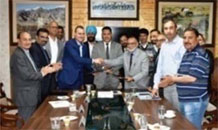 MoU Signing Ceremony
Prestigious IIGP-2019 AwardThe university is the winner of ‘India Innovation Growth Programme’ for the second consecutive year. Dr Ambreen Hamadani, Ph.D. scholar of Division of Animal Breeding & Genetics, was declared as one of the winners of the IIGP-2019.
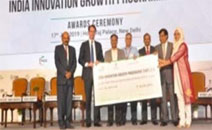 Scholar receiving the award
|
UNIVERSITY OF AGRICULTURAL SCIENCES, RAICHUR9th ConvocationThe ninth convoca-tion of the university was held on 26 June, 2019 at the main campus.
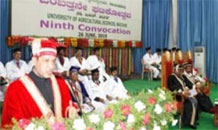 Dr Ashok Dalwai, delivering
convocation address 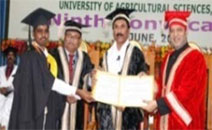 Mr Channabasava, receiving
Gold medal 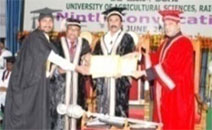 Mr K. Chandrakumar, receiving
Gold medal Dr K. N. Kattimani, Vice-Chancellor, briefed about the progress of the university.
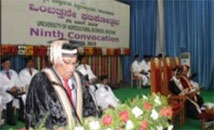 Dr. K. N. Kattimani, VC, briefing about
the progress of the university In extension, transferring the technology on real-time basis through e-SAP, demonstration of IFS module in the different agro-climatic situations, demonstration of IPM and ICM in major crops,
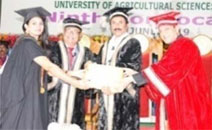 Ms Shripriyanka Nalla, student
receiving Gold medal Meeting of ZREAC and ZREFC Kharif & Rabi 2018-19The Zonal Research and Extension Advisory Council (ZREAC) and Zonal Research and Extension Formulation Committee (ZREFC) meeting was organized during 6-8 June 2019 at the main campus.
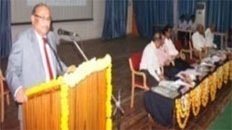 Dr K.N. Kattimani, addressing
scientific community |
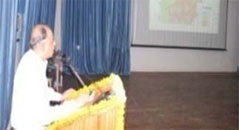 Dr Satyanarayana Rao, briefing about
Agricultural situation During the meeting, Officers of the university, all the scientists from Teaching, Research and Extension department were present on this occasion. Dr Satyanarayana Rao, Associate Director of Research, presented the seasonal conditions and rainfall pattern of the research stations coming under Raichur, Koppal and Ballari districts for the year 2018. Dr J.R. Patil, Associate Director of Research, Kalaburagi, presented the seasonal conditions and rainfall pattern of the research stations coming under Bidar, Kalaburagi and Yadgir districts for the year 2018. The farmers from six districts of Hyderabad-Karnataka region gave their feedback about the problems faced and the need-based research.
During the meeting, 35 new farm trial proposals and 40 technologies for large-scale adoption by the farming community in the Zones-1, 2 and 3 were accepted. The new technical programme for the year 2019-20 was formulated, discussed and approved in the meeting.
UNIVERSITY OF AGRICULTURAL AND HORTICUL-TURAL SCIENCES, SHIVAMOGGA (KARNATAKA)Zonal Research and Extension Programme Workshop of Kharif-2019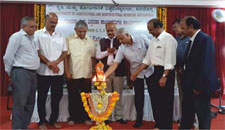 Dr M.K. Naik inaugurated the
ZREP Workshop During the workshop four varieties were released1. Flood-tolerant red rice variety "Sahyadri Panchamuki (IRGA-318-11-6-9-2B)"“Sahyadri Pancha-muki (IRGA-318-11-6-9-2B)” is the high-yielding,
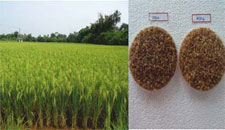 Sahyadri Panchamuki (IRGA-318-11-6-9-2B)
2. High-protein rice variety “Sahyadri Megha”This is a high-yielding rice variety with medium plant stature, dark green foliage without any pigmentation,
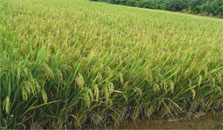 Sahyadri Megha
3. Drought-tolerant variety “Tobios -6 of FCV tobacco “This is the flue-cured tobacco variety, released for light soils of Karnataka.
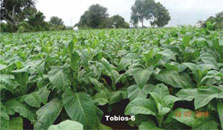 Tobios -6
|
4. Cowpea variety “Sahyadri Yukthi” (UAHS-28)’, suitable for limited moisture conditionsThis is the cowpea variety suitable for late kharif and summer season,
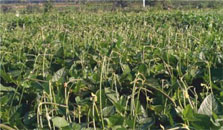 Sahyadri Megha
Annual Review Workshop of KVKs of Zone-XIAnnual Review Workshop of KVKs of Zone XI was held at Krishi Vigyan Kendra, Mudigere, dist (Chikmagalur) during 14-16 May, 2019. Dr M. K. Naik, VC, during his inaugural address highlighted the role of KVKs in disseminating the technology to the farming community and also the key role of KVKs in food security. Dr Ranadhir Singh, Assistant Director-General
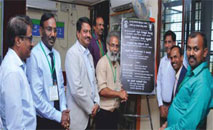 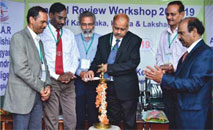 Annual Review Workshop of
KVKs Zone XI National PG Research Conference- 2019The PG Research Conference 2019 was organized at University of Agricultural and Horticultural Sciences, Shivamogga on 20 May, 2019. Dr Narendra Singh Rathore, Deputy Director-General (Agriculture Education.),
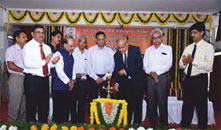 Dr Narendra Singh Rathore,
inaugurated the National PG Research Conference- 2019 Skill-Development TrainingA Skill Development Training on Small Poultry Farming was organized from 04 Apr - 03 May, 2019 at Krishi Vigyan Kendra, Shivamogga for the unemployed rural youths under the financial assistance of Agricultural Skill Council of India.
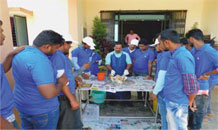 Skill Development Training at Krishi
Vigyan Kendra, Shivamogga Skill Training for Rural YouthSkill training programme on Mushroom Production Technology for the rural youth (STRY) was organized during 24-29 June, 2019 at Krishi Vignan Kendra, Shivamogga, in collaboration with MANAGE,
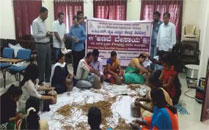 Skill training programme on Mushroom
Production Technology |
VASANTRAO NAIK MARATHWAD KRISHI VIDYAPEEHT, PARBHANIRelease of NHH 44 BG-II Bt Cotton HybridThe VNMKV, Parbhani and Mahabeej jointly launched the India’s first public sector Bt cotton hybrid ‘NHH 44 BG II’ on 15 June, 2019, and made a its seed available to the cotton growers of Marathwada region. After long waiting, intra hirsutum cotton hybrid ‘NHH 44’ is now available in BG II version for the farmers of Marathwada region. The NHH 44, released by VNMKV,
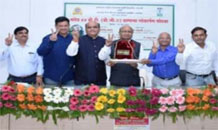 Launching of new Cotton
Hybrid NHH 44 BG-II On the launching ceremony, Dr A. S. Dhawan, VC, stated that NHH 44 BG II is the first Bt cotton hybrid released by public sector in Maharashtra. Further, he added that the farmers of this region were eagerly waiting for
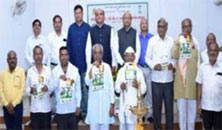 Launching of Bt Cotton Ceremony
AwardsMAHARASHTRA ANIMAL AND FISHERY SCIENCES UNIVERSITY, NAGPURHonorary Rank of Colonel to Prof. A.M. PaturkarThe Ministry of Defence, Government of India granted Prof. A. M. Paturkar, Vice Chancellor, the honorary rank of Colonel in the National Cadet Corps, and appointed him as Colonel
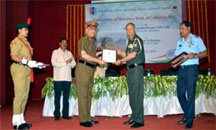 Conferment of Honorary Rank of
Colonel to Prof. A. M. Paturkar |
Honors to Dr Adhiti K. BhanotraDr Adhiti K. Bhanotra, Assistant Professor, Department of Veterinary and Animal Husbandry Extension, Mumbai Veterinary College was conferred with “Women Extension Scientist Award” and “Best Poster- Presentation Award” for the
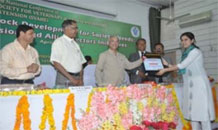 Dr Adhiti K. Bhanotra, receiving
“Women Extension Scientist Award” Best Teacher Award to Dr S.P. WaghmareDr S. P. Waghmare, Professor, Department of Veterinary Clinical Medicine,
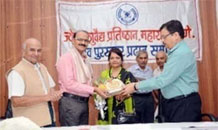 Dr S.P. Waghmare receiving
“Best Teacher Award” Best Poster Award to Dr V.M. VaidyaDr V. M. Vaidya received the Best Poster Award (Second Position) during the ‘Zoonoses and Public Health session’ in Sixteenth Annual Symposium of The Indian Association of Veterinary Public
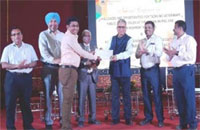 Dr V.M. Vaidya receiving
Best Poster Award Reviewer Excellence Award-2019 to Dr D.N. Bajad Dr D.N. Bajad
Dr D. N. Bajad, Professor, Department of Dairy Chemistry, College of Dairy Technology,
Warud (Pusad) was honoured with the Reviewer Excellence Award-2019 for his outstanding contribution to the Asian Journal of Dairy & Food Research (Agricultural Research Communication Centre, Haryana).
Dr Shital Chopde Commissioned as Lieutenant in NCC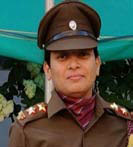 Dr Shital Chopde
Dr Shital Chopde, Assistant Professor, Department of Animal Nutrition, Nagpur Veterinary College, Nagpur was commissioned as Lieutenant on 13 Apr, 2019 after undergoing a rigorous training of 3 months at NCC Officers’ Training Academy, Gwalior. Lt. Shital Chopde joined as Associate NCC Officer at 1 Maharashtra and Remount and Veterinary Squadron NCC, Nagpur. The only NCC unit in Maharashtra Animal & Fishery Sciences University Nagpur, where the training of Horse riding is being imparted to the Senior Division & Senior Wing NCC cadets. This Unit is also playing a key role in shaping the career of cadets and inculcating discipline and patriotism in them.
|
PROFESSOR JAYASHANKAR TELANGANA STATE AGRICULTURAL UNIVERSITY, HYDERABADHonors to Dr V. Praveen RaoDr V. Praveen Rao, VC, PJTSAU received the “Leader with Strategic
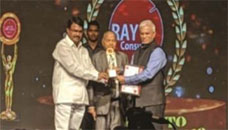 Dr V. Praveen Rao, VC,
receiving the award Awards to Miss V. Manasa ReddyMs V. Manasa Reddy, student from Agricultural College, Jagtial, received one silver and one bronze medal in Fourth International Turkish Open Kick-boxing Tournament- 2019, held at Antalya, (Turkey) during 4-7 Apr. 2019 under senior musical forms (19 - 40 years) (Soft Style weapon and Soft Style) category.
VASANTRAO NAIK MARATHWADA KRISHI VIDYAPEETH, PARBHANIAwards to AICRP on Dryland Research Project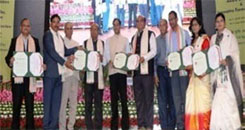 Award Ceremony Celebrations
AICRP on Dryland Research Project of VNMKV, Parbhani bagged the ICAR’s Vasantrao Naik National Award for the year 2018 during the ICAR’s 91st Foundation Day celebrations. These were held at the National Agricultural Science Centre Complex, Pusa,
|
New Delhi on 16 July, 2019. Dr A.S. Dhawan, Vice-Chancellor; Dr D P Waskar, Director of Research; and Dr. B. V Asewar, team leader of the scientists of AICRP for Dryland Research Project, received the coveted award. Shri Narendra Singh Tomar, Union Minister of Agriculture and Farmers’ Welfare was President of the award ceremony. The Union Ministers of State for Agriculture and Farmers’ Welfare, Shri Parshottam Rupala and Shri Kailash Choudhary, along with Shri B.D. Sharma, Member of Parliament, and Dr Trilochan Mohapatra, Secretary (DARE) & DG (ICAR) were present during the occasion
The research centre was conferred with this award for its commendable scientific contributions made in dryland agriculture. The project on ‘Development of climate resilient technology to cope with drought situations in Marathwada region of Maharashtra’ was executed at the AICRP for Dryland Agriculture, Parbhani (main centre) and at three villages of Parbhani districts in about 1250 farmer’s fields through participatory mode. Fourteen out of 19 technologies entered into the university package. Further, these technologies were adopted by the Government of Maharashtra in its flagship programme on Jalyukta Shiwar and Project on ‘Climate- Resilient Agriculture’. The dryland technologies like farm pond, open well and bore well-recharging technology, conservation furrow, broad bed and furrow (BBF), tied ridging, intercropping, contingency crop planning and stress management practices were implemented on farmer fields. The weather forecasting and the agro advisory were timely provided to the farmers of the National Initiative on Climate Resilient Agriculture-adopted village. Custom-hiring centres were established. Further, the centre is imparting training to the officials of the State Department of Agriculture, and line department, KVKs, NGOs, Agricultural Technology Management Agency officials as well as farmers. The centre is playing a key role in providing technical inputs to the mission mode projects like Dryland Farming Mission and Project on Climate Resilient Agriculture of Government of Maharashtra for drought proofing of Marathwada region. The team of scientists of AICRP for Dryland Research Station includes Dr B.V. Asewar, Dr Madan Penke, Dr Surendra Choulwar, Dr Anil Gore, Dr Megha Jagtap, Dr Ganesh Gaikwad, Dr Papita Gourkhede, Dr Ravindra Chary of CRIDA, Hyderabad were recipients of the award.
|

